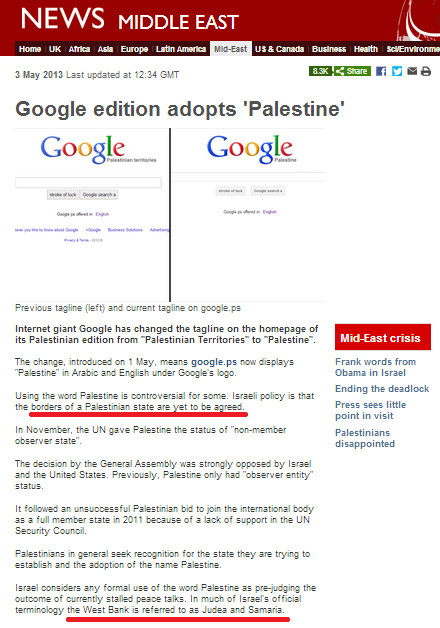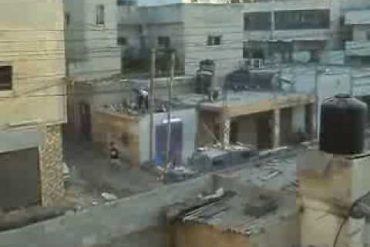An article which appeared on the BBC News website’s Middle East page on July 18th with the headline “Iran nuclear: Ayatollah Khamenei chastises ‘arrogant’ US” purported to summarise in its 319 words a speech made by Khamenei on the same day.
An English translation of that speech is available via Potkin Azarmehr’s blog and it runs to 1,769 words. Mr Azarmehr notes:
“Unlike Western Media’s translation of the speech, Supreme Leader never once refers to a “deal” but consistently calls it a document and that is the most important thing about the Supreme Leader’s speech.”
However, in the BBC’s account of the speech readers are told four times that Khamenei used the words ‘deal’ or ‘agreement’.
The BBC report states: [all emphasis added]
“Iran’s stance towards the “arrogant” US will not change despite the nuclear deal reached earlier this week, supreme leader Ayatollah Ali Khamenei has said.”
And readers are told that Khamenei said:
“Even after this deal our policy towards the arrogant US will not change.” […]
“We have repeatedly said we don’t negotiate with the US on regional or international affairs; not even on bilateral issues.”
The relevant section of the translated speech reads as follows:
“The next point is that our policy towards the arrogant government of America will not change in any way despite these negotiations and the document that has been prepared. As we have said many times, we have no negotiations with America on different global and regional issues. We have no bilateral negotiations with America.”
Khamenei went on to say:
“Sometimes, we have negotiated with them in exceptional cases such as the nuclear issue and we have done so because of our interests. The nuclear issue was not the only case. There were other cases as well which I have referred to in my previous public speeches. The American policies in the region are 180 degrees the opposite of the policies of the Islamic Republic. The Americans accuse Hezbollah and the Lebanese Resistance – who are the most self-sacrificing forces in their country in the area of national defense – of terrorism. There is no injustice worse than this. This is while they support the terrorist child-killing government of Zionism. How can one do business, negotiate and reach an agreement with such a policy? There are other cases as well and I will expand on them in other speeches.”
The BBC’s representation of that was as follows:
“In a speech marking the end of the Islamic holy month of Ramadan, he said Iran still had sharp differences with the US, above all over the Middle East.”
And audiences were told that Khamenei said:
“There are some exceptions like the nuclear programme that we negotiated with Americans to serve our interests… US policies in the region are diametrically opposed with Iran’s policies.”
The BBC tells readers:
“Iran would continue to back Syria, Iraq, the Palestinians and “oppressed people” in Yemen and Bahrain, he said.”
And:
“”Whether the [nuclear] deal is approved or disapproved, we will never stop supporting our friends in the region and the people of Palestine, Yemen, Syria, Iraq, Bahrain and Lebanon,” Ayatollah Khamenei said.”
The relevant section of the translated speech in fact reads:
“The next point is that whether this document is ratified or not, we will not abandon our regional friends: the oppressed people of Palestine, the oppressed people of Yemen, the people and government of Syria, the people and government of Iraq, the oppressed people of Bahrain and the sincere mujahids of the Resistance in Lebanon and Palestine. These people will always enjoy our support.”
In other words, the BBC has censored Khamenei’s pledge of support for the Syrian regime and for terrorist organisations including Hizballah, Hamas and the Palestinian Islamic Jihad.
BBC audiences are told that:
“The supreme leader also denied that Iran was intending to create a nuclear bomb.
“The Americans say they stopped Iran from acquiring a nuclear weapon,” he said in his speech at the Mosala mosque in Tehran.
“They know it’s not true. We had a fatwa [religious ruling] declaring nuclear weapons to be religiously forbidden under Islamic law. It had nothing to do with the nuclear talks.”
The relevant section of the translated speech reads as follows:
“Another point is about the Americans’ blustering in recent days. In the recent days that the negotiations have been concluded, the American excellencies – their male and female officials – are busy blustering. Each of them is blustering in a different way. Of course, this is alright with us. Their domestic problems force them into blustering. They claim that they have dragged Iran towards the negotiating table, that they have made Iran surrender, that they have obtained such and such concessions from our country and other such claims. However, the truth is something else. They say that they have prevented Iran from building nuclear weapons, but this has nothing to do with our negotiations with America and other countries. They themselves know this and sometimes they have spoken about the importance of the fatwa that bans nuclear weapons.
According to the commands of the Holy Quran and Islamic sharia, we consider building, keeping and using nuclear weapons as haraam and therefore, we will not do so. This has nothing to do with them and with these negotiations. They themselves know that this is the truth. They know that what prevents the Islamic Republic from building nuclear weapons is not their threats and intimidating behavior. There is a religious barrier behind this and they know the significance of this fatwa, but they still claim that it was they who prevented Iran. They are not honest with their own people and they do not tell them the truth. On various other matters, they say that they have adopted such and such a measure about Iran’s nuclear industry and that they have forced Iran to surrender, but they can only see Iran’s surrender in their dreams.”
As has been the case in the past, the controversy surrounding the topic of that apparently unwritten fatwa is not clarified to BBC audiences and as has been noted here before, readers may find this essay by a former BBC Persian analyst helpful in understanding the significance – or lack of it – of such a fatwa.
BBC audiences are told that:
“The supreme leader said it was now necessary for Iranian politicians to scrutinise the nuclear agreement and make sure that Iran’s national interests were being preserved.”
The relevant section of the translated speech reads:
“Of course in order to ratify this document, there is a clear legal procedure that, by Allah’s favor, has to be taken. We expect that these officials take the interests – interests of the country, interests of the people – into consideration by paying careful attention, so that when they deliver the matter to the people, they can do so with their heads held high in front of Allah the Exalted as well.”
As we see, the version of Khamenei’s speech presented to Western audiences by the BBC replaces the word ‘document’ with ‘deal’ or ‘agreement’. It also censors the Iranian regime’s expression of continued support for terrorism and, of course, its anti-Israel content.
BBC audiences trying to understand the significance and implications of the JCPOA signed between the P5+1 and Iran would obviously have found that information beneficial to their understanding of the reservations raised by many parties in relation to the likely effects of sanctions relief on Iran’s patronage of terrorist groups in the Middle East and beyond. The BBC, however, chose to censor that information.
Related Articles:
More spin than a centrifuge: BBC report on Khamenei nuclear deal speech




